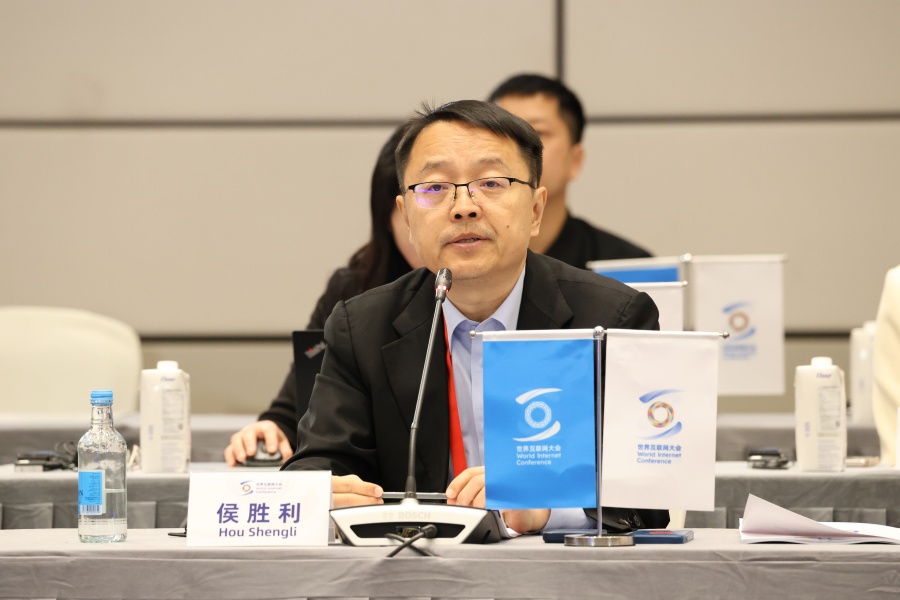
- Home
- Media Center
-
Events
- Wuzhen Summit
- Regional Forums
- Practice Cases of Jointly Building a Community with a Shared Future in Cyberspace
- World Internet Conference Awards for Pioneering Science and Technology
- The Light of Internet Expo
- Straight to Wuzhen Competition
- Global Youth Leadership Program
- WIC Distinguished Contribution Award
- Membership
- Research & Cooperation
- Digital Academy
-
Reports
- Collection of cases on Jointly Building a Community with a Shared Future in Cyberspace
- Collection of Shortlisted Achievements of World Internet Conference Awards for Pioneering Science and Technology
- Reports on Artificial Intelligence
- Reports on Cross—Border E—Commerce
- Reports on Data
- Outcomes of Think Tank Cooperation Program
- Series on Sovereignty in Cyberspace Theory and Practice
- Other Achievements
- About WIC
- 中文 | EN

Workshop on AI Governance and Sustainable Development|Hou Shengli: Advancing AI sustainability through infrastructure, security, talent development

Hou Shengli, vice-chair of the World Internet Conference (WIC) Specialized Committee on Artificial intelligence and executive vice-president and CTO of Cisco Greater China, speaks at the Workshop on AI Governance and Sustainable Development of the 2025 WIC Asia-Pacific Summit in Hong Kong on April 14. [Photo/wicinternet.org]
Strengthening energy optimization, security governance and inclusive education is essential to laying a solid foundation for the sustainable growth of artificial intelligence (AI), said Hou Shengli, vice-chair of the World Internet Conference (WIC) Specialized Committee on AI, at the "AI Governance and Sustainable Development: for Good and for All" Workshop during the 2025 WIC Asia-Pacific Summit in Hong Kong on April 14.
Hou, who is also the executive vice-president and CTO of Cisco Greater China, stated that AI infrastructure, including computing power, networks and storage, has become a major energy-intensive sector.
He noted that Cisco has developed proprietary chip technology that boosts performance by 40 percent while reducing power consumption by 96 percent. By replacing traditional electro-optical modules with silicon photonics solutions, his company is able to save over 10 million kWh of electricity per data center annually - effectively balancing computing power growth with energy conservation goals.
Addressing the security challenges posed by generative AI, Hou proposed a three-tiered defense mechanism. First, building an AI application discovery system to accurately identify workloads of private enterprise models and cloud-based applications; second, developing a real-time risk monitoring system to detect model vulnerabilities and adversarial attacks; and third, reinforcing operational safeguards through dynamic defense technologies against prompt injections and data breaches to ensure full-cycle safety and controllability of AI applications.
Hou also highlighted the importance of education in fostering AI talent. To bridge the digital divide, Cisco's Networking Academy program has supported over 10,000 educational institutions worldwide, by offering free access to AI courses and certification exam systems. The program trained tens of thousands of professionals with core AI competences each year. This industry-education integration model has created a virtuous cycle for talent development, providing a steady supply of skilled professionals to fuel the sustainable growth of AI.

The World Internet Conference (WIC) was established as an international organization on July 12, 2022, headquartered in Beijing, China. It was jointly initiated by Global System for Mobile Communication Association (GSMA), National Computer Network Emergency Response Technical Team/Coordination Center of China (CNCERT), China Internet Network Information Center (CNNIC), Alibaba Group, Tencent, and Zhijiang Lab.





